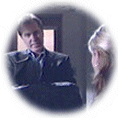
         
    
|
 Where did Buffy start for me? For me, it was Surprise, that turning-point of the second season where Angel lost his soul and the show suddenly leapt from its own cult enclave into the limelight of the mainstream. Sure, it wasn’t the first time that I’d heard of Buffy, I’d seen a couple of episodes and been impressed, especially at the moment where Buffy hefted that lump-hammer and smashed the Master’s bones to dust in When She Was Bad. But before Surprise it was a show that I might watch, but would more often not bother. Afterwards, there was little in the world that would make me miss the next week’s episode. It came as no surprise to me when I made my first tentative steps out into Buffy on the web, that in this I was not alone. The Angelus storyline culminating in the second-season finale Becoming blew up a storm at the time and remains one of the most influential segments of the show today, with many fans citing it as their favourite segment ever. And brilliant moments it had by the bushel: _that_ swordfight, when Spike gets out of his chair, Giles setting about Angelus with a flaming baseball bat, and that heart-wrenching, tear-jerking ending. Once I had experienced all that, I was with Buffy for life, and so I have remained. I have never quite watched a show that has so repeatedly confounded my expectations as Buffy. It was almost as reliable as an atomic clock: Joss would plan the latest freaky thing to do with the show, I’d hate the idea, then when I saw the finished product, I’d love it. When I first heard of a second Slayer I thought: typical, they have a Chosen One, so why are you ruining the concept by adding another? Then season three just blew me away, Faith’s turn, the vampire Willow and bestriding it all the wonderful, despicable Mayor. The musical, I’ve always hated musical episodes and the last ones I’d seen in Ally McBeal and Xena were no exception. And yet Once More With Feeling I can’t believe I liked it. Spike coming back as well, I’d really liked him post-Innocence but when I heard he’d been signed up for two seasons? I never thought it could work. But it did, and it was brilliant and it powered the seasons forward. I discovered the site All Things Philosophical on Buffy the Vampire Slayer, a site steeped in weighty considerations of Good & Evil, metaphysics and morality, authored by one Masquerade. This opened up a whole new side of Buffy for me. Instead of being simply an hour’s diversion a week, I began to consider some of the events in the episodes, I questioned the characters’ actions and the roles that they developed for themselves. And I think the reason I and others were able to do this was because the show held itself up to this sort of analysis and to these questions of authority, morality and responsibility. It was this aspect of Buffy was the first thing about which I felt I could give something back. It was the first thing that gave me the urge to go out and create through the medium of the web. Above the Law was for me, an early step in the realisation that the ability to shape the world around me does not rest exclusively with other people. There is nothing inherent in being the Slayer that required Buffy to take up its burdens, as we saw clearly with Faith. Though power and responsibility walk hand in hand they are not the same critter. In Buffy the protagonist exists in an environment outside our society, there is no justice, no protection, no law that she does not have to enforce herself. She is the lone representative of order, the sheriff of the border between the underworld and our world, and as part of that she had to develop what her law, her ethics, her code should be. It is in this way, that Buffy has a relevance to us all. Though we live in a society of law and passed-down cultural values, we all have power and we can all exercise it in whatever manner we wish within certain boundaries. Oddly enough, it is far more apparent through television than in real life the standards we set for our heroes and, I hope, we would aspire to ourselves. Their situations and dilemmas are sharper, clearer, the correct path to take more obvious and the ‘bad’ one that much more deserving of censure. In real life, things can be so murky, so complicated, and our own nature draws us in very different directions from that in which we feel we ought to go. We react and make decisions based on anger, on discrimination, on cowardice and jealous self-interest and we condemn others for actions for which we would excuse ourselves. On television it is easy but through our own eyes it can be so hard to live as we think we should live and then hold to it rather than just letting the vicissitudes of life override our values. Buffy learnt it, she had to judge her instincts over morality, and she had her successes and her failures and had to take the responsibility for them, just as we must do. So what finally of the end of Buffy? Everyone will have their own opinion of it, especially the final unanswered question. For me the underlying theme of the show was always one of destiny. As the Slayer, Buffy was told that she had one single, unalterable destiny, to fight and die and not survive for long. Despite this, she has always fought against the fate prescribed for her, in keeping her friends, her relationship with Angel, her split with the Council, the First Slayer and her ultimate defeat of the mystics who gave the Slayer her power, but constrained her and controlled her through her isolation. Now is she truly free of destiny? She’s no longer alone, she's one of many, but she’s still the only one who knows what has happened. She’s still needed to find the new chosen and teach them who they are and what has gone before, because who else is there to do it? Nevertheless, she has fought her fight triumphed and more than that, she has broken the shackles that bound the Slayer, reinvented her world and redefined her destiny to be one that she herself has chosen. |
Have an opinion? Want to read others?
Go to this article’s Opinion Board
Or you can
Email the Webmaster
Before using the Opinions Boards please read the FAQ.
Buffy the Vampire Slayer and Angel: The Series are the property of the WB Network or perhaps Fox, maybe both. I'll leave them to work it out and contact me with the result. This web site, its operators and any content on this site relating to "Buffy the Vampire Slayer" are not authorized by Fox. No copyright infringement intended. This site is for entertainment purposes only and does not profit in any way.
The picture was taken from The Slayer Show and is © the WB.
The Above the Law banner is an altered form of a screen-cap taken from the The Slayer Show, the original screen-cap is © the WB.